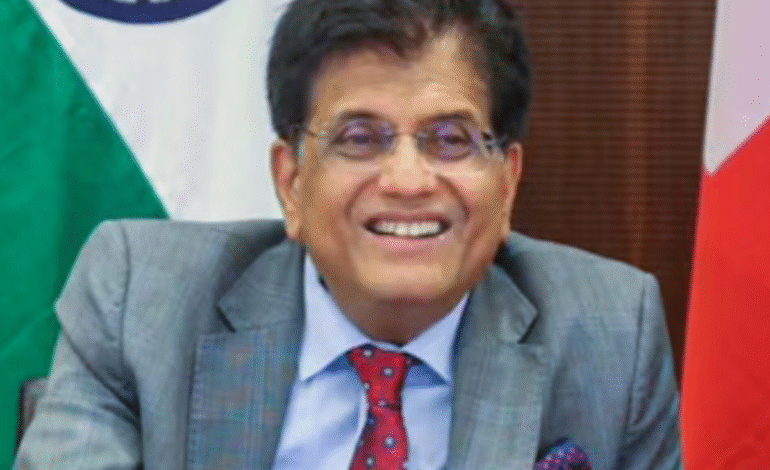India-EFTA Free Trade Deal Secures $100 Billion Investment

India and the European Free Trade Association (EFTA) have officially ushered in a new era of economic collaboration with the signing of the Trade and Economic Partnership Agreement (TEPA). Signed on March 10, 2024, and expected to become fully operational by October 2024, the agreement marks a significant advancement in India’s international trade strategy. The EFTA, comprising four non-EU European nations—Switzerland, Norway, Iceland, and Liechtenstein—brings considerable economic clout to the table, particularly through Switzerland’s renowned innovation and manufacturing strength.
The TEPA is positioned as a comprehensive framework designed to foster long-term stability, enhance investment flows, and encourage preferential trade between India and the EFTA bloc. According to India’s Commerce and Industry Minister Piyush Goyal, the agreement brings “stability, predictability, and continuity”—qualities essential for boosting confidence among global investors and trade partners.
TEPA: Laying the Foundation for Long-Term Cooperation
The newly formed TEPA is not just a trade deal; it is a forward-looking partnership that covers a broad spectrum of economic activities, including trade in goods and services, regulatory cooperation, and large-scale investments. With India securing a $100 billion investment commitment over the next 15 years from the EFTA nations, the deal is set to significantly deepen bilateral economic ties.
This long-term investment commitment positions India as a promising and stable destination for global capital. The financial engagement is expected to fuel sectors like manufacturing, infrastructure, clean energy, pharmaceuticals, and digital technologies—areas where India has demonstrated consistent growth and where foreign expertise can complement domestic capabilities.
Significant Investment Commitment Reflects Mutual Economic Trust
The $100 billion investment pledge made by the EFTA countries sends a strong signal of trust in India’s growth story. It affirms global confidence in India’s evolving economic and regulatory landscape. This commitment is structured to support inclusive development by channeling funds into key sectors over a 15-year period, allowing for both depth and sustainability.
Switzerland’s high-tech manufacturing, Norway’s renewable energy expertise, Iceland’s leadership in geothermal technologies, and Liechtenstein’s prowess in finance and precision engineering will each play unique roles in this collaboration. The diversified strengths of the EFTA nations align well with India’s development priorities and reform agenda.
Expanding Trade Horizons Through Preferential Market Access
One of the key provisions of TEPA is the facilitation of preferential market access for a range of goods, which is expected to energize trade volumes between India and the EFTA countries. Products such as Swiss watches, premium chocolates, and cut and polished diamonds are likely to gain enhanced access to the Indian market, while Indian pharmaceuticals, textiles, and IT services are set to benefit from reduced barriers to entry in EFTA markets.
This mutual access is not only beneficial from a trade volume perspective but also enhances consumer choice, promotes healthy competition, and enables technology and quality standards exchange. It could particularly benefit small and medium enterprises (SMEs), which often face challenges navigating complex international trade rules.
India and EFTA: A Synergistic Economic Match
The TEPA is rooted in complementary strengths. India offers a vast consumer base, a growing industrial landscape, and a large, skilled workforce. In contrast, the EFTA countries bring technological sophistication, regulatory excellence, and innovation-driven economies. Minister Goyal emphasized that this combination significantly increases the scope for productive and strategic cooperation.
The partnership is expected to foster joint ventures, research collaborations, and supply chain integration. Swiss companies may look toward India for scalable production facilities, while Indian companies might tap into Swiss precision and quality engineering. Norway’s clean energy innovations, particularly in offshore wind and hydropower, may support India’s green transition goals. Similarly, Iceland’s geothermal technology can contribute to sustainable energy projects.
India’s Internal Preparedness Underscores Strategic Intent
India has completed its internal ratification process for TEPA, demonstrating readiness and a strong commitment to move ahead with implementation. The swift domestic approval also reflects India’s institutional preparedness and the alignment of the agreement with its long-term economic planning.
Over the past few years, India has made significant progress in improving its ease of doing business, modernizing regulatory frameworks, and enhancing digital governance. These structural reforms have paved the way for India to become a more attractive destination for global trade and investment. TEPA now adds a strategic layer to these efforts, creating structured and predictable mechanisms for long-term cooperation.
Private Sector Participation Key to Realizing Agreement Potential
While governments can lay the legal and regulatory framework, it is the private sector that ultimately drives trade and investment outcomes. Minister Goyal has urged businesses across India and EFTA countries to take full advantage of the new opportunities created by the agreement. This will require active engagement from industry bodies, chambers of commerce, and trade promotion councils.
Awareness programs, business forums, and sector-specific dialogues will play an essential role in ensuring that companies understand the provisions and potential of the TEPA. Small and mid-sized businesses, in particular, should be supported with advisory services and incentives to help them explore new export and import markets within the EFTA bloc.
Integrating into Global Value Chains Through Strategic FTAs
The TEPA represents another milestone in India’s broader goal of integrating more deeply into global value chains. As part of a larger foreign trade policy vision, India has been actively pursuing FTAs with countries and regions across the world, including Southeast Asia, the Middle East, and Australia.
These agreements help position India as a credible alternative in global supply chains that are increasingly seeking diversification. The move aligns with broader economic shifts, particularly strategies by global firms to reduce reliance on a single manufacturing source and to explore new innovation hubs.
Economic Value of EFTA: Small Bloc, Significant Impact
Despite their small populations and geographical size, the EFTA nations possess robust and highly developed economies. Switzerland is a global leader in finance, precision manufacturing, and pharmaceuticals. Norway offers significant expertise in oil, gas, and renewable energy. Iceland has developed world-leading capabilities in geothermal energy and sustainable fisheries, while Liechtenstein is known for its engineering and financial services.
Collaborating with these countries not only opens access to high-value goods and services but also promotes knowledge exchange, skill development, and technological upgrades. It allows India to tap into the best practices of high-performing economies and align its own industries with international quality and sustainability standards.
Future Prospects and Dynamic Partnership Management
As with all international agreements, TEPA is built to evolve. The agreement includes mechanisms for periodic reviews and refinements, which ensures flexibility and responsiveness to changing economic conditions. This allows both India and the EFTA nations to remain aligned with emerging challenges and opportunities.
Sectoral task forces, joint working groups, and trade facilitation mechanisms will help maintain momentum and address any implementation challenges. Sustainability, digital transformation, and clean technology integration are likely to become key pillars of future cooperation under TEPA.
Setting the Tone for a Progressive Trade Future
The Trade and Economic Partnership Agreement between India and the EFTA countries marks a crucial step in reshaping India’s global trade architecture. It demonstrates a strategic commitment to long-term, rules-based international cooperation and highlights the mutual value that emerging and developed economies can bring to each other.
For India, the agreement supports its ambition to become a major hub for global trade, services, and manufacturing. For the EFTA nations, it offers access to a dynamic and expanding market. As the agreement moves toward full implementation, the shared focus on stability, investment, and innovation will be key to turning potential into progress.








1 Comment
[…] devastating air tragedy struck India on June 12, 2025, when Air India Flight AI171 crashed shortly after takeoff from Ahmedabad airport. […]
Comments are closed.